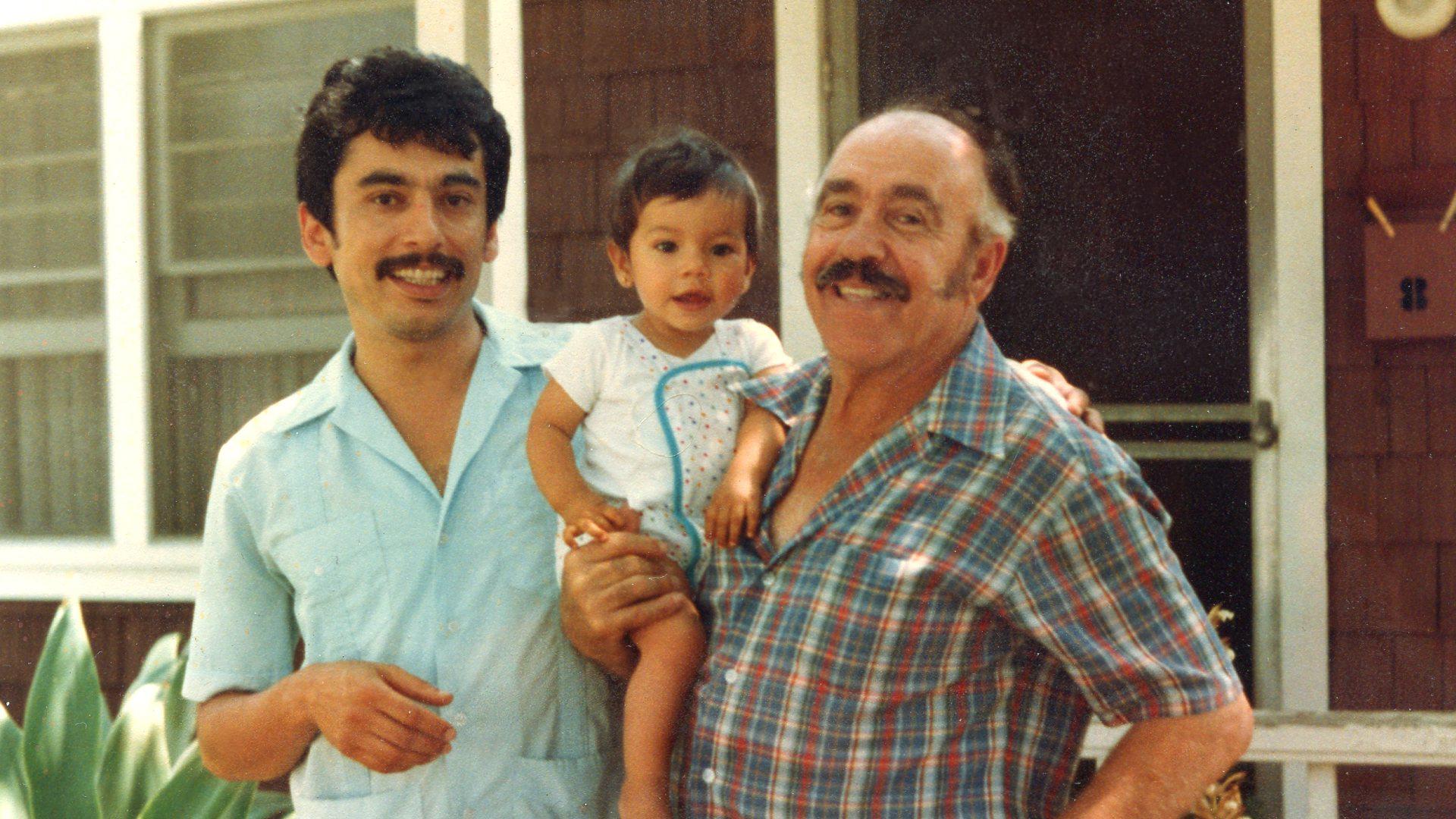Alejandro Murguía, left, with his daughter and father in Southern California in the 1980s.
“It was in October, must have been 1955,” says Alejandro Murguía, San Francisco’s poet laureate, remembering his early years back in California. He was born in the United States, but moved with his family to Mexico when he was a toddler — first Mexico City, then Tijuana.
At age 6, he returned to Southern California with his family for economic reasons. It was a rough age to restart life in another country but, eventually, Murguía would author the Southern Front and This War Called Love. Both won the American Book Award.
Murguía, born in 1949, talked to us as part of our First Days series, when immigrants and refugees share their early memories of growing up in the US. Here, we’ve focused on his early school days as part of Global Nation’s education coverage.
Back in California, Murguía remembers being “the only non-white person in the school” during his early grades. “Totally white kids, and so there was a period when I was very silent. It’s through reading that I break out and find my place in school,” he says.
By third grade, he was a voracious reader. “I remember my library card having like 30 books checked out that semester,” he says.
“By the time I’m 15, I start scribbling in notebooks every night. Here’s what would happen. I’d go to the liquor store and buy a big bottle of RC Cola, not realizing the caffeine was going to keep me up all night. So I’m writing in this journal until I finally fall asleep at one o’clock, something like that. But then the next morning, I can’t get up to go to school, right? So it became this endless cycle. High school was a complete disaster for me.”
But Murguía credits his art teacher, Grace García, with noticing his passion. “I started showing her some of my work, and she gives me a lot of books to read, a lot of heavy stuff. I’m reading Sartre, ‘No Exit,’ for example, and ‘Nausea’ and ‘Candide’ by Voltaire. And she’s sending us to museums to look at Picasso, Van Gogh and Dalí. And we’re all in love with Dalí because he’s so far out and crazy and stuff. And that’s probably where I first started reading poetry.”
García also encouraged Murguía to take his SATs. “I scored really high,” he says. “And so she showed up one day during that summer and takes me to Los Angeles City College and enrolls me. If she had not done that, I had no idea of going to college. My dad always encouraged us to not work like he did. He was a laborer. So he encouraged us to be educated. But obviously he didn’t know how to go about the process. He insisted that we finish high school, which we did, but after that, he had no idea how to enroll somebody in college. He’d never been on a college campus. So it was kind of fortuitous that Grace García sent me to college.”
Listen to Alejandro Murguía read “O California.” See English translation below.
O CALIFORNIA
se fueron
por el camino real
ese largo y triste camino de eucaliptos
en carretas con burros
un montón de frijol y maíz
y llegaron en lowered down chewys
with gafas fileros
speaking about the low life
tomando botellas de tequila
que decían Made in Mexico
hablando tres palabras en inglés
apple pie y coffee
cantando
Vámonos a California
Vámonos a California
se iban
por el alambre
indios de calzón blanco y huarache
y aterrizaban
pochos pachucos perdidos
vatos locos con tatuajes mágicos
de vida y muerte
esperando en las esquinas el big hit
the 5 & 10 of caliente race track
that never came
cantando calladitos por las calles iban
Vámonos a California
Vámonos a California
they came
from New York
New York the big apple
to the big orange
Yorubas Jíbaros Borinquens
regando las calles de bacardí
piel color café oscuro
ojos de verde cocodrilo
y un tun-tun de tambores
de viejas selvas ancestrales
que alguna vez fueron
pero ahora con mil memorias
de viajes mal pagados
Vámonos a California
Vámonos a California
Vámonos a California
English translation:
O CALIFORNIA
they went
along the Camino Real
that long and sad road of eucalyptus
in carts with donkeys
an enormous heap of beans and corn
and arrived in lowered down chevys
with sunglasses switchblades
speaking about the low life
drinking bottles of tequila
that said Made in Mexico
speaking three words of English
apple pie and coffee
singing
Let's go to California
Let's go to California
they went
through the barbed wire
Indians in white trousers and sandals
and landed
pochos pachucos lost
crazy guys with magical tattoos
of life and death
waiting on corners for the big hit
the 5 & 10 of Caliente Race Track
that never came
singing quietly they went along the streets
Let's go to California
Let's go to California
they came
from New York
New York the big apple
to the big orange
Yorubas Jíbaros Borinquens
watering the streets with Bacardi
skin the color of dark coffee
eyes of crocodile green
and a tun-tun of drums
of old ancestral jungles
that existed at one time
but now with a thousand memories
of voyages badly paid
Let's go to California
Let's go to California
Let's go to California
From Fiesta en Aztlán, Capra Press, 1982.
Facebook page about "The Other Barrio," a documentary about Murguía.
